Focal Upright’s Locus Leaning Stand Up Desk Review
- Lab tested
Like most reviews sites, our editorial staff and laboratory testing expenses are partially offset by earning small commissions (at no cost to you) when you purchase something through those links. Learn More

Overview
| Review Summary |
An ergonomist’s dream realized by a craftsman. Focal owe themselves a pat on the back – the Locus really is an impressive piece of work. We’ve seen leaning chairs before, but most follow a somewhat Spartan mold. Not so with the Locus; the pairing of desk and chair makes this the first integrated leaning workstation we’ve tested. Well-designed, well-built, and supported by a friendly, dedicated company – the Locus should be the first port of call for anyone interested in a leaning workday. |
|---|---|
| MSRP / List Price |
$ 1,106 |
| Street Price | Scan for available discount deals |
| Warranty |
Limited Lifetime Guarantee |
| Lift Type |
Mechanical Crank |
| Transit Speed |
4 turns per inch |
| Sizes Available |
30″ x 48″ |
| Adjustment Range |
Maximum Height: 48″ |
| Weight Capacity |
180 lbs. |
| ANSI/BIFMA Certified |
No |
| NEAT™ Certified by Mayo Clinic |
No |
| Competition | Compare to All ]Compare to All Top-Rated Standing Desks |
| Where to buy |
Buy on Amazon |
Rating
| Stability | |
|---|---|
| Safety | |
| Reliability | |
| Customer Experience | |
| Quality and Aesthetics | |
| Ergonomics | |
| Innovation | |
| Value | |
| Positives | The Locus workstation is a gorgeous piece of furniture in its own right, and brings some major health benefits to the (pardon the pun) table. Focal’s tilting chair is the slickest active seat we’ve seen to date, not to mention the most comfortable. A wide range of helpful, optional peripherals take the Locus from adjustable table to full workstation. |
| Negatives | Leaning chairs are relatively new to the ergonomics scene, and come with a bit of a learning curve. |
Bottom Line
[Editors’ Note – This product seems to be no longer available from the manufacturer. We will keep this review up for future reference and comparison.]
Review
[Editors’ Note: Upstart FocalUpright was sold to Safco, a multi-billion dollar furniture company, in 2017. The domain name for the company, focalupright.com, has long ago been taken down and is now being squatted on by a speculator in Tokyo. Not to be confused with focaluprightfurniture.com, which is some sort of interior design firm with no connection to Safco or the original company.]
If you’re having trouble making up your mind between a sitting desk and a standing desk, then maybe you can settle on something in between. Leaning stools take the ergonomic benefits of standing, and the lazy comfort of sitting, and gives users a combination of the two. They’re a great alternative to the back-punishing office chairs we’ve grown accustomed to, and are often more compatible with a standing desk. Focal Upright Furniture has expanded the simple premise of the leaning stool into a full-fledged desk system designed for a comfortable, more active workday. The Locus Workstation pairs an adjustable height stand up desk of Focal’s own design with a unique leaning stool guaranteed to keep you in ergonomic comfort.
Stylish Leanings
 Like any leaning stool, the Locus is designed to inject some activity into a seated workday. Rather than resting on top of the seat, a user leans back against it, placing some of the weight on the chair, and keeping some of it on their feet. It may seem a little strange at first, but this tripod configuration does plenty to fight off sitting disease. Keeping weight on the legs prevents a worker from becoming truly sedentary. The constant, gentle muscular activation experienced in a leaning chair helps ward off the metabolic shutdown that results from a day spent on your rear, but does so without the increased cardiovascular load, strain, and fatigue that long-term standing desk use can inflict. Leaning also happens to be better for your back, putting your spine in a gentler position—135 degrees or so—than the harsh right angles of office chairs.
Like any leaning stool, the Locus is designed to inject some activity into a seated workday. Rather than resting on top of the seat, a user leans back against it, placing some of the weight on the chair, and keeping some of it on their feet. It may seem a little strange at first, but this tripod configuration does plenty to fight off sitting disease. Keeping weight on the legs prevents a worker from becoming truly sedentary. The constant, gentle muscular activation experienced in a leaning chair helps ward off the metabolic shutdown that results from a day spent on your rear, but does so without the increased cardiovascular load, strain, and fatigue that long-term standing desk use can inflict. Leaning also happens to be better for your back, putting your spine in a gentler position—135 degrees or so—than the harsh right angles of office chairs.
Now, a Locus is a pretty hefty purchase – for that price you could snag yourself a treadmill desk, or a gold-plated standing desk, your choice. So why should you go with the leaning chair? We’ve already broken down the standing vs. leaning contest, let’s get into walking vs. leaning. It’s no contest in terms of overall activity levels, and it probably won’t surprise you that walking cooks off calories a lot faster than leaning. But the Locus shines in terms of usability. It’s more, compact, quieter, and a whole lot prettier than any treadmill desk we’ve seen. On top of that, it’s much, much easier on the body. Walking takes some getting used to, and it’s possible to overestimate how much time you can spend on a treadmill. Few people can handle an entire day spent on their feet, moving or not, but letting the Locus take some of the load can greatly extend the time you spend out of your chair.
Leaning chairs are also generally active seating options. Most will swivel, tilt, and shift, keeping a user active (and ideally strengthening core muscles) as they change positions along with the chair. Every company has their own method for injecting instability, ranging from the rubber ball base of Focal’s Mogo to the spring strut of the Muvman stool. Focal opted for a brass and steel pivot joint, giving their seat a wide range of smooth, quiet movement. The practical effect is a chair that allows gentle, swivelling hip motions – picture a very slow motion hula. It’s not dramatic enough to be distracting, or even really noticeable; instead, the Locus causes and conforms to natural fidgeting movements, remaining comfortable all the while and staving off lower back pain.
We’re also major fans of the Locus’ seat pan (available in Citrus, Chili Pepper, and Black). Saddle seats have become the norm for leaning chairs, and for good reason. The raised central ridge of a saddle seat – along with two contoured indents for a user’s thighs – guides the legs into the correct position for the recommended leg-and-stool tripod base. The Locus seat pan is bolstered with a bit of padding, and tilts downward to encourage a relaxed, open hip angle, a position that pushes the pelvis forward, straightening the spine and taking pressure off the lumbar vertebrae.
The foot board protruding out from the front of the Locus chair is something we haven’t seen before. Yes, it does give the seat the same general profile of a jet ski, but there’s a very good reason for its inclusion. All other leaning options we’ve seen require a user to put their feet flat on the ground to form a tripod base. As a result, it’s possible for a user to overextend their feet at the ankles. Keep that position up for a couple of hours, and you’ll wind up paying for it with fatigued, possibly pained legs. Such is the case for Focal’s Mobis leaning seat, which fall short of the Locus’s capabilities. Focal’s decision to include an angled footrest with the Locus chair completely negates the problem. By keeping their feet in an inclined, neutral position, a user can use the workstation comfortably for much longer than they could with other leaning chairs. An optional footrest ($75) also adds some stand-extending padding – we use optional in the loosest sense only, this one really is a must-have.
New Stand Up Desk Angles
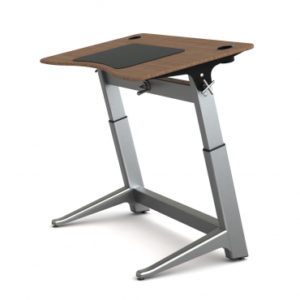 In terms of sheer eye candy, the Locus desk is a welcome departure from the norm, and it’s instantly obvious how much work Focal designer Martin Keen put into the Locus desk. The angled legs and steampunk knobs are worlds away from prevailing table design. And those knobs are more than decoration – the tabletop can actually incline, turning the workstation into a drafting table. We’re not huge fans of positive tilt for computing – negative tilt actually has healthier ergonomic effects – but engineers, architects, illustrators, and anyone who wants more of a drafting table might find the feature handy.
In terms of sheer eye candy, the Locus desk is a welcome departure from the norm, and it’s instantly obvious how much work Focal designer Martin Keen put into the Locus desk. The angled legs and steampunk knobs are worlds away from prevailing table design. And those knobs are more than decoration – the tabletop can actually incline, turning the workstation into a drafting table. We’re not huge fans of positive tilt for computing – negative tilt actually has healthier ergonomic effects – but engineers, architects, illustrators, and anyone who wants more of a drafting table might find the feature handy.
A central crank hidden beneath the tabletop allows users to fine tune the height of their desk. It’s not an ideal spot for the crank, as users have to bend quite a bit to change the desk’s height, but does manage to remain out of the way during use. With four turns to an inch of travel, the Locus isn’t the fastest mover we’ve ever seen, but that’s not too much of a problem, as there’s generally no need to adjust once you’ve found your favorite spot. A height range of 36” to 48” means that those seeking a true sit to stand desk might want to look elsewhere, but users from 4’11” to 6’10” can all find a comfortable position while working on the Locus seat. At 90 lbs, the Locus desk isn’t exactly portable – something we found out the hard way while picking up our evaluation unit – but it’s quite stable, and can work under loads up to a hefty 180lb.
However, once you throw an office treadmill into the mix, the Locus tells a different story. The most obvious issue is the Locus seat, which takes up quite a bit of real estate and would be difficult to use atop a treadmill. The crossbar between the two legs also prevents many treadmills from extending as far under the desk as they’re designed, and users may find themselves pushed farther away from their desk as a result. Moreover, the 48″ maximum height—while perfectly suitable for standing—does not account for the extra 6 inches of height that comes from a treadmill, and many users may find it too short for their needs. Desks like the iMovR Energize XT and Lander Desk can reach max heights of 55″, relegating the Locus to a purely a lean to stand desk role.
The Locus tabletop measures 30” by 48”, and has a gentle contour on the leading edge. Tabletops are constructed out of high-grade plywood (the layers are attractively visible along the edges of the table), and are available in four colors; black, white, oak, and walnut. This multi-ply construction results in a surface so rigidly strong that the tabletop support beam you expect to always find on an adjustable-height desk has been dispensed with. Want to install a keyboard tray? No problem, Locus tabletops are .75” thick and durably constructed. In fact, we recommend a keyboard tray to allow you to type in wrist-healthy ergonomic angles. As the top only attaches to the frame at the sides to allow tilting, and it lacks the crossbar normally found on adjustable desks, even fully retractable ergonomic keyboards trays can be attached.
And if that’s not enough for you, Focal has a whole range of add-ons to help you trick out your Locus…
Locus Deluxe
The most important addition you can snag is the antifatigue pad we mentioned before, but there are a few others worth mentioning.
 A Stay Flat shelf is a pricey, but worthy upgrade. These raised shelves bolt directly onto the desk frame, and won’t incline along with the tabletop. They’re a natural perch for monitor arms, speakers, and cacti – basically anything you don’t want sliding around if you decide to tilt your desktop.
A Stay Flat shelf is a pricey, but worthy upgrade. These raised shelves bolt directly onto the desk frame, and won’t incline along with the tabletop. They’re a natural perch for monitor arms, speakers, and cacti – basically anything you don’t want sliding around if you decide to tilt your desktop.
Focal’s task light won some quick fans at the office. Three brightness levels and five temperatures, ranging from sunny to cool, help set the mood at your workstation. The touch buttons also render it irresistible to the gadget lover that lurks within us all.
Cable management troughs can also be bought. These gutters attach to the central beam of the Locus’ frame, and can comfortably house one or two power strips. Finally, Focal offers iMac brackets for securing iMac, Thunderbolt, and Cinema displays to the Stay Flat shelf.
Friendly Focal
Focal is fast becoming one of our favorite companies. They’re small, family run, and far more personal than many of the production giants we deal with daily. Founder and designer Martin Keen (yes, the same man whose name is on the famous Keen footware) has an eye for innovation – if you haven’t checked out the Mogo travel seat yet, you really should – and we’ve got high hopes for Focal’s next creations that are coming down the pike. To make sure you don’t miss their introductions be sure to subscribe to our free newsletter.
Warranty
Like many Focal products, the Locus desk comes protected by a limited lifetime warranty, aside from the tabletop, which has a 10-year warranty. The Locus chair comes with a 5-year guarantee. Focal guarantees repair, replacement, or refund in the case of failure due to defect during normal use under warranty.
Price Options and Accessories
| Focal Locus Workstation | Price |
| Locus Chair | $690.00 |
| Locus Desk (Matte Black or Glacier White) | $1,290.00 |
| Locus Desk (Oak or Walnut) | $1,390.00 |
| Focal Locus Workstation Accessories | Price |
| Anti-Fatigue Mat | $75.00 |
| Stay Flat Shelf (laminate) | $250.00 |
| Stay Flat Shelf (wood veneer) | $275.00 |
| Focal LED Worklight | $175.00 |
| Cable Management Tray | $100.00 |
| iMac Bracket | $50.00 |


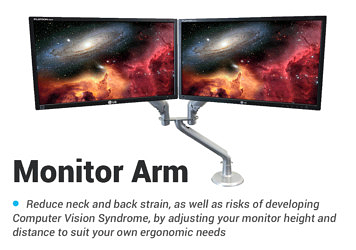
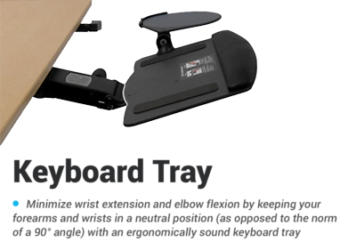
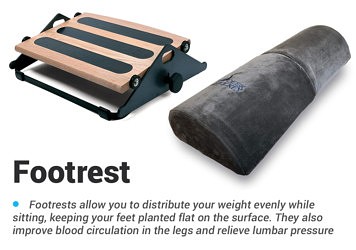
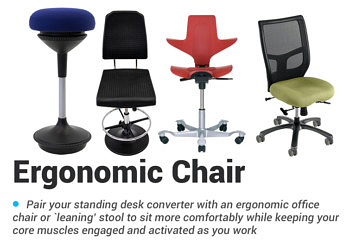
1 Comment
Leave a response >